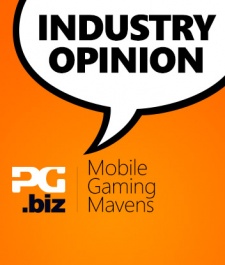The PocketGamer.biz Mobile Mavens is our panel of experts drawn from all sectors of the mobile gaming industry.
Last week saw Great Big War Game developer Rubicon take to its blog to complain about the game bringing in just £52 a week on the Windows Store for Windows RT.
The problem with take up, the studio claimed, lay with the fact Microsoft had refused to feature the game. Microsoft's reason was that the game is only available on RT, rather than Windows 8. Microsoft is looking to present a unified storefront, so is only looking to promote universal apps.
Though studio owner Paul Johnson denies it, many developers reacted to his blog post, suggesting he was purveying a sense of entitlement, and that he has no right to expect his game to be featured on every marketplace it launches on.
So, we asked the Mavens:
How much responsibility should a platform holder hold for insuring quality games on its marketplace are discovered by consumers? Is getting featured still as crucial as it use to be, and what contingency plans can a developer put in place to ensure it isn't the be all and end all?

Oscar Clark has been a pioneer in online, mobile, and console social games services since 1998. He is also author of the book, Games As A Service – How Free To Play Design Can Make Better Games.
It's the job of every developer to push as hard for its content as it can, but it's not the job of the platform holder to necessarily respond. The customer has to come first and his or her experience is paramount.
That being said, I think that the platform holder ignores the developer's interests at their peril. In this case, it seems to me that Rubicon could have acted less negatively than it did and that might have won it a bit more goodwill.
On the other hand, I suspect that this has forced Microsoft's store team to rethink how to handle Windows RT content, which - lets be honest - was necessary.
To me it's all a bit of an unnecessary kerfuffle that leaves everyone looking a bit damaged - sad really.

Kerfuffle. Not a word I use enough, thanks Oscar!
If you make £52 a week and you think you should be making more, you've either misjudged your product, your model for distribution/monetisation, or your target platform. You're basically not doing your job very well.
Lashing out to platform holders for not featuring your product is ridiculous if they are not featuring it, you have not made a case compelling enough for them to feature you.
I am not blind to the importance of features, but the perceived notion that success is determined by platform holders is so 2005. Yes, that's when you could buy a content aggregator a fine lunch, and get featured.
Fortunately there are other options today, and if you're smart, you can get platform holders to carry you even further. Stop whining.
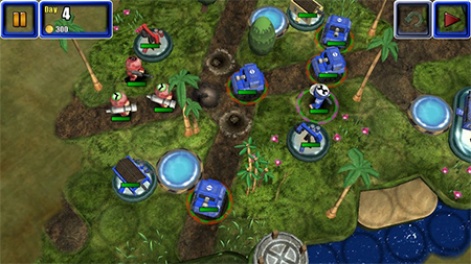
Here's another word. Poppycock.
To think that Microsoft or any platform holder has an obligation to feature any game is pure unadulterated poppycock.
And let's be clear on all this: Rubicon knows why its game wasn't featured - because it's not a universal app.
All platform holders have criteria that that use in order to determine which apps get featured. Typically, if a new piece of hardware, or new feature in the OS comes out, they will go out of their way to feature apps that take advantage of these key new components.
As an app developer, if you are serious about having your app featured, it's your duty to figure out what's important to the platform holder and make your app as attractive as possible to these decision makers. Even then, you are not guaranteed a promotion.
This is a long term game that we are in and there are a limited number of platforms you can sell your games on. It's not good to burn bridges just because you didn't get featured. It's appropriate to ask why you didn't get featured, make an update to your app and try to get featured on the second round.
Also, especially with Windows RT, I think there is cause to adopt realistic expectations with some platforms. The new Windows is really new - £52 might very well be an average take for an app right now.

John is co-founder of PR and marketing company Big Ideas Machine. Also an all-round nice guy...
I couldn't agree more with what Dave and Thomas have already said.
If your entire business plan for your app is based on the app store doing your marketing for you, then I'm afraid you deserve the failure that will most likely be your reward.
It's been the same since the days of Java games - there is simply too much content being launched every day for any kind of storefront or deck to showcase anything except the fortunate and clever few.
That said, I do have some degree of sympathy with Rubicon.
We don't know if, in encouraging them to develop a Windows version of their app, there were suggestions that the app would be featured.
Certainly, people involved with the launch of Windows 8 - and there are a few amongst the Mavens - were extremely bullish about the prospects for the store and for new devices; maybe the heady euphoria suffered as a result of all the hype meant people got a bit carried away.
And in terms of contingency plans? Plan for failure and hope for success. Assumption is the mother of all fuck-ups.
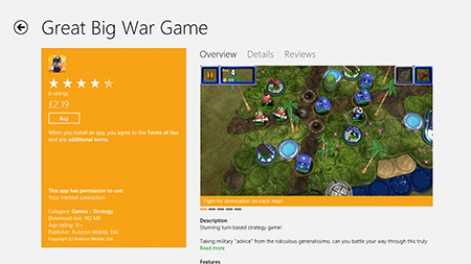

As I understand it, Microsoft has always been pretty clear that RT-only apps won't be pushed, so if it coaxed Rubicon into thinking that wasn't the case, then that would be pretty bad practice.
I believe Rubicon launched on Windows RT of its own accord - at least that's what Johnson suggested to me in an interview.
The reason the game is RT only in the first place, however, is because Rubicon signed over the PC rights for Great Big War Game to another party, who will be launching it on the Windows 8 version of the store at a later date.
This does raise the question, however, of whether other apps might fall into this trap, and might need to separate the Windows 8 Store from the rest of the PC market when signing deals with publishers.
Or, indeed, whether Microsoft needs to feature RT-only apps in a dedicated section.
That's just unfortunate deal making.
No one can see the future roadmap of these platforms and at the time I expect it would be reasonable to think that a PC license would never collide with Windows' mobile or tablet ventures.
It's not the first or last time something like has happened or will happen. Rubicon just happened to lose this round of licensing lottery. Luckily these specific platforms are not very high stakes at this time.
Actually, after thinking about it, Rubicon has screwed up any chance that the Windows 8 version will be featured as well.
It would probably make more sense to pull the RT version - since it's not making a lot of revenue - and give it to Rubicon's licensing partner so that version has more of a chance at success.

Oscar Clark has been a pioneer in online, mobile, and console social games services since 1998. He is also author of the book, Games As A Service – How Free To Play Design Can Make Better Games.
I think its important to consider why you are working with any new platform.
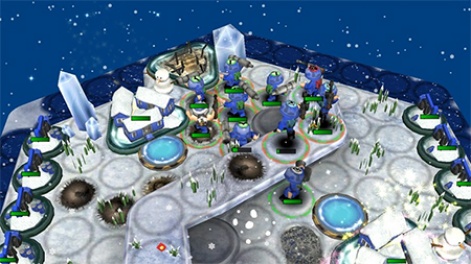
Expecting a restrictive version (i.e. an RT only package) to make huge pockets of cash immediately on a new platform is a little naive. Not least as its not playing to the strengths of Microsoft's store.
The better reason to do it is for the PR value it gives you, and the early access and good will you get if the platform takes off. And that takes long-term thinking.
Instead, with Rubicon telling the world about its poor revenues during what is obviously an incubation period for the RT platform is a really short-sighted approach. I didn't know about the licensing issues, but I don't care - that's ultimately something Rubicon was in control of and its not the platform holder's fault.
But I also can't help seeing the other side too and, of course, this does highlight the risk that Microsoft took by not making the RT platform entirely compatible with the PRO version of Windows 8.
I believe its a great move to support ARM, and have no doubt the issues of making ARM and Intel versions compatible is an enormous issue.
But, again, as a consumer I don't care. I need to buy a Window's machine and be able to trust that the software I buy will just work. That's what the brand means to me.[/people]

I think that's what Microsoft did do, though.
I think it was especially wary of going down the Android route of letting all apps appear to all people, only for them not to run when downloaded. The Windows Store appears to come with two layers of protection.
Search for Great Big War Game on a Windows 8 machine, for example, and it just won't appear. Likewise, the Windows 8-specific apps won't show up on a Windows RT unit.
For the time being - as in, for as long as Windows 8 games don't receive massive amounts of exposure in the press - the consumer is none the wiser about what apps they may or may not be missing out on.
The Store is presented as a unified marketplace, but it only shows apps that will run on their machine.
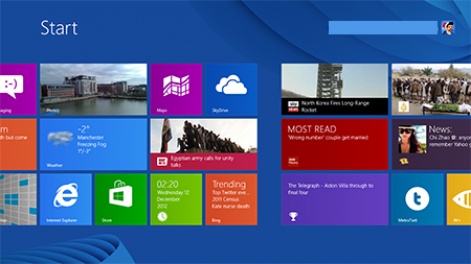
The second level is aimed at Windows 8 units. Having put Windows 8 on my rather underpowered notebook, I've since encountered one or two apps that, when I click on the download button, inform me that my hardware isn't powerful enough to run it.
While frustrating at the time, I think that's a better strategy than letting me download it before it runs my notebook into the ground. It's not perfect, but I can see the logic in it - and, likewise, the reason why Microsoft wouldn't want to push Windows RT specific games.
The moment you start seeing "Available on Windows 8 Store" or "Available on Windows RT Store and Windows 8 Store" buttons start popping up, then the whole marketplace will look too confusing for the majority of folk.
I agree with Oscar, though, that it's not perfect, and ultimately we'll have to see whether consumers get pissed off. Actually, the perverse fact is, this is only likely to become an issue if both versions of the Surface - and other Windows tablets - take off to iPad levels in the years ahead.

